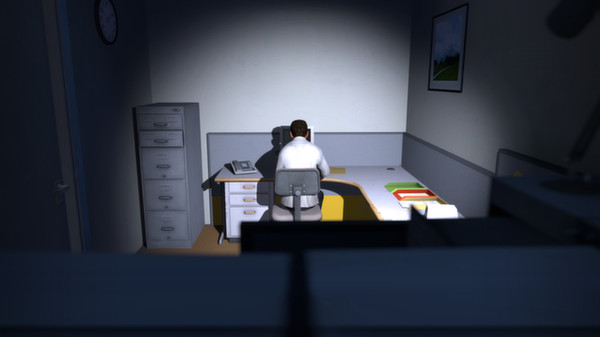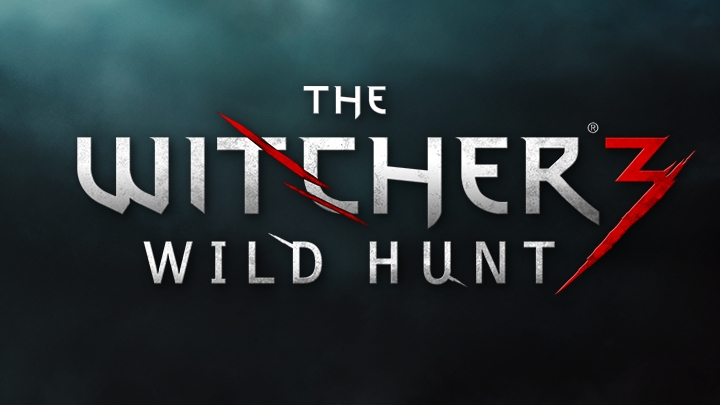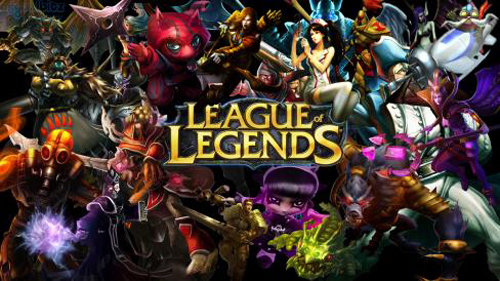Features
What The Stanley Parable, Octodad, and Jazzpunk Have to Teach Us About Making a Great Comedy Video Game

 The struggles of the comedy genre in gaming are well documented. Truly funny video games are such a rare occurrence, that the appearance of one can cause grown men to go on a James Stewart-like celebration run through the streets. Even worse than the quality of the usual dreck gaming tries to pass off as funny, is the fact that many developers are apprehensive to even attempt comedy games, as they are not only notoriously difficult to pull off, but typically don’t sell very well to boot.
The struggles of the comedy genre in gaming are well documented. Truly funny video games are such a rare occurrence, that the appearance of one can cause grown men to go on a James Stewart-like celebration run through the streets. Even worse than the quality of the usual dreck gaming tries to pass off as funny, is the fact that many developers are apprehensive to even attempt comedy games, as they are not only notoriously difficult to pull off, but typically don’t sell very well to boot.
Yet over just the last several months, we’ve been gifted with three truly great comedy video games.
Considering one is about an office drone confronted with the burden of choice (The Stanley Parable), one is about an Octopus trying to pass as a human (Octodad), and the other is about…hell to to tell you the truth I beat the game and I’m still not sure how to describe it (Jazzpunk), you may not initially group these games together. Yet they are all spiritually linked by both their ability to make the player laugh uncontrollably, and by their status as some of the only truly classic comedy games ever made.
It may be easy to write off their triumphant appearances over such a short time frame in an otherwise barren genre as an anomaly, but that would be doing a tremendous discredit to the game’s developers. Not to mention that when you put aside their subject matter and look solely at the structure of these games, you see they share some common aspects that could very well help form a blueprint for the creation of further great gaming comedies.
Comedy Starts With the Gameplay
One of the roadblocks that has kept gaming from easily producing more comedies, is the fact that good comedy requires perfect timing. As video games are a user driven affair that don’t necessarily adhere to a timing friendly structure, it makes a fundamental component of the genre a bit of a problem.
It’s why when designing a comedy video game, the humor has to start with the gameplay. The Stanley Parable achieves this by allowing the player choice, but by making sure each of those choices follows a tightly structured comedic path. Jazzpunk pulls off a similar feat by using the fixed nature of the typical point and click adventure game to create a world where gags, and not clues, are your primary marks of progression. Octodad, meanwhile, fully commits to the idea of creating a game that actually tries to show just how difficult being an Octopus disguised as a human is, courtesy of some fiendishly challenging controls.
My point is this. If a player isn’t inspired to laugh by the basic gameplay of your title, then no series of references or site gags is going to really get the job done. Which leads me to my next point…
Comedy in Gaming Must be a Commitment, and Not Just an Element
If you’re designing a video game to be funny, you really have to do so from the ground up. That means that there are certain genres and game elements that just aren’t going to work for a comedy.
That isn’t to say that you can’t have a fast paced, large level shooter with funny parts (like Blood Dragon or Bulletstorm), but if the goal is to make a true comedy that will end up being memorable years down the road for its humor, then the game has to showcase a complete dedication to comedy, and not just a casual relationship with it.
More than anything else, I feel this is where most video game comedies fail. Comedies in gaming may be such a rarity that the genre isn’t even traditionally recognized on Steam and other marketplaces, but to create a great one, being funny has to be the focus above all else.
Find the Intelligence in Absurdity
Do you know why shows like Adventure Time, SpongeBob SquarePants, Animaniacs, and South Park appeal to age groups beyond what their basic content may initially suggest?
It’s because as absurd and childish as the shows may be, there is an underlying intelligence behind them. Sometimes that does mean a more adult reference or two, but more often than not it applies to a fundamental dedication to filling even the most ridiculous of premises with a cleverness that is often so subtle, it often goes unappreciated as effortless.
Just about every good comedy has some elements of absurdity to it, and the ones that are able to be even more ridiculous while maintaining intelligent design tend to be the ones with appeal that span generations.
Your Writing Has to be Sharp
So how does someone populate a world of insanity with intelligence, without coming up with something that feels like a clash of styles? More often than not the answer is through clever writing.
Look at the three examples I’ve started with for good references of that idea. The Stanley Parable is filled with the kind of dry wit that wouldn’t be out of place in a Douglas Adams book, Jazzpunk can constantly catch you off guard with its ridiculous references even when you’ve become accustomed to its over the top style (think South Park), and as for Octodad, you only have to give a listen to the game’s theme song to see how it makes the most out of its concept through good writing.
Without good writing, your joke’s punchline will not hit. You can set up all your game’s gag’s perfectly, but if you can’t finish it with a payoff that takes the user by surprise, then it was all for nothing.
Keep it Simple
This one may be controversial considering that every other entertainment medium has comedic works that span the entire world, or even the entire universe, and still manage to be funny.
But gaming isn’t quite there yet. Maybe one day it will provide a traditional epic that makes us all laugh till we hurt, but for right now the most recent examples of true comedic gaming successes all show the benefit of keeping your set-up fairly basic.
Whether that means sticking to the tight paths of The Stanley Parable, dividing your game into small sections like in Jazzpunk, or just getting the most out of a single joke like in Octodad, for the moment it appears that games are better off employing a minimalist mentality while the foundations of comedy in gaming are still being established.
Features
Razer Gold for Less: Insider Tips for Buying Discounted Gift Cards on BuySellVouchers

Razer Gold is a virtual currency that is offered by the Razer company. You can use Razer Gold to purchase new games and in-game content. Usage Razer Gold gift cards give you a better bang for your buck and when you top up your Razer Gold, you get Razer Silver in return which you can exchange for even more rewards.
Every buyer loves a good discount no matter what product it is you’re buying. The same goes for buying discounted Razer Gold gift cards. Gamers tend to rely on gift cards a lot to make their gaming purchases. By using discounted gift cards, you can not only make your transaction almost instantly but also do it cost-effectively.
In this article, we’ll tell you all about buying discounted Razer Gold gift cards and how to utilize them in order to reap the maximum profits possible as well as addressing some common concerns and providing tips to make a smooth transaction.
Understanding Razer Gold and BuySellVouchers
Razer Gold is your all-in-one currency to purchase various games and in-game content from the Razer website. Razer Gold can be obtained by purchasing it directly or redeeming Razer Gold gift cards. Using Razer Gold vouchers is a much cheaper and convenient way to carry out all your gaming transactions.
Buying Razer Gold gift cards through BuySellVouchers
If you want to top up your Razer account, you can simply purchase a Razer Gold gift card. The smart choice would be to get a discounted Razer Gold gift card but where can a person get one? BuySellVouchers of course. BuySellVouchers has a huge category of discounted Razer Gold gift cards so you can browse and buy the one you deem best.
Discounted gift cards obviously save you money. So why not use them? By using discounted gift cards, you can purchase any game you want at a much cheaper price than buying it directly from official stores.
Why Choose BuySellVouchers for Razer Gold PINs?
Discounted Gift Cards
There are many reasons to choose BuySellVouchers for buying and selling gift cards over other platforms. One of the main reasons is discounts, which can reach up to 35% of the gift card’s nominal value. It has the best prices and special discounts across most of its products which makes BuySellVouchers a no-brainer if you want to purchase cheap gift cards. BuySellVouchers also has support for various payment methods including crypto such as USDT, BTC, USDC, and e-wallets like Maya and GrabPay (at the Official Store).
Razer Gold gift card giveaways
Every other week, BuySellVouchers provides gift card giveaways. Since users have the opportunity to select their preferred gift card platform for the giveaways, Razer Gold gift cards are frequently chosen. Each giveaway typically offers 10 gift cards, each valued at $10.
Comparison with other platforms offering Razer Gold gift cards
If we compare the price of the cheapest 10 USD Razer Gold gift card among some other popular marketplaces, we can see that BuySellVouchers offers the lowest price of 9.06 USD.
Kinguin.net has a price of 11.75 USD:

G2A.com has a price of 10.19 USD:

User reviews highlighting positive experiences with BuySellVouchers
If you’re concerned about the legitness of the BuySellVouchers platform, then you can look at the response of past customers of the platform to determine its legitness. A few reviews about the Buysellvouchers marketplace on Trustpilot.com are included below.


Insider Tips for Maximizing Savings
Tip #1: Timing is Key
If you want to obtain the best deals and discounts on BuySellVouchers, then timing is everything. Sellers may offer big discounts during special promotional events or during holidays. During these times, be sure to check prices regularly.
Tip #2: Explore Different Sellers
When you want to buy a gift card, be sure to explore different sellers and compare the prices among them. Your sentence is mostly correct, but it can be improved for clarity and consistency. Choose the seller that offers the lowest price and has a good reputation (high seller rating). You can evaluate a seller’s performance by looking at his reviews and successful sales history.
Tip #3: Take Advantage of Promotions
From time to time, there may be ongoing promotions on the BuySellVouchers or Razer platform. During these events, you can generally save even more money due to bigger discounts.
Tip #4: Bundle Deals
Some sellers on the platform also offer discounts for bulk purchases. These packages will save you more money than if you buy gift cards one by one. The bigger your order is, the more you can save. There are sellers who sell gift cards in bulk at very good prices.
Tip #5: Monitor Price Trends
Gift card prices can fluctuate from time to time. The product that you want to buy today may not be offered at the same price tomorrow. In such an event, your best option would be to wait for the price to go down again. To monitor the prices, you should be kept updated on the BuySellVouchers platform whenever you can.
Ensuring a Smooth Transaction
Account setup
To create an account on BuySellVouchers, click on the Register button at the top.

After that, you can either Sign Up using your existing Google gmail account or alternatively create your own unique BuySellVouchers account by entering a valid e-mail address, a username and password.

After you input your details and click on the Sign Up button, you will then be asked to verify your e-mail by clicking on the link you just received in your e-mail address. Do that and you’re all good to go.
A step-by-step guide to purchasing Razer Gold gift cards on BuySellVouchers
To browse all available Razer Gold gift cards on BuySellVouchers, you can either use the search function or browse the Razor Gold category.

Choose the product that you want to buy and then after that, click on the Buy Now button. Select your desired payment method, enter your email address where you want to receive your product and then click on the Buy button.

Wait for your order to be processed. After that, the gift card code will be delivered to you.
Tips for verifying the authenticity and value of gift card listings
To verify the authenticity and value of gift card listings, you can look at the seller’s reviews and feedback to determine if he’s a legit seller or not. If the reviews are generally positive, then you can go ahead and buy from him. If reviews are negative, you should tend to avoid him.Safety measures and precautions for buyers to avoid scams or fraud
To find the sellers with the most positive feedback, you can use the filter function on BuySellVouchers which will bring the sellers with the best feedback in descending order. Each seller has a seller level that determines their success with the platform. By buying from the top-rated sellers, there is nearly zero chance for you to get scammed. If you want 100% risk free purchases you can buy your gift cards from the Official BuySellVouchers Store where every product is offered by the official seller of the platform.Real-Life Success StoriesTestimonials from gamers who have purchased Razor Gold gift cards from BuySellVouchersBelow, you’ll find the feedback of a few people who have successfully purchased a $100 Razer Gold gift card from BuySellVouchers.
How buying and using discounted gift cards has helped people with financial concerns
Buying discounted Razer Gold gift cards allow people to purchase games that they weren’t able to previously due to financial issues. Using discounted Razer Gold gift cards allows you to buy games at a very cheap price and also get Razer Silver in return which you can redeem for even more rewards.
Addressing Common Concerns
Addressing skepticism or doubts about the legitimacy of discounted gift cards
Before anyone buys a discounted gift card for the first time, they have many doubts in mind. They wonder about the possibility of being scammed, but we can assure you that if you buy your discounted gift cards from BuySellVouchers Official Store, you will never face such a problem.
Clarifying buyer protection measures and recourse in case of issues
In case you face issues with your seller regarding your purchases, you can either contact him to discuss your issue and get it resolved. If the seller doesn’t reply or refuses to resolve your issue, you can contact the BuySellVouchers customer support. If you haven’t received your product, you might be able to get a refund as well.
Providing guidance on compliance with terms of use for Razer Gold gift cards
To prevent any future issues or misconceptions. Be sure to fully comply with the Razer Gold terms of service. Upon redeeming a Razor Gold gift card, the gift card balance will be added to your account and it must be used within one year. However, you are exempt from this if you live in certain areas where this is prevented by law.
Conclusion
Razer Gold gift cards allow you to top up your account and purchase games and in-game content in a fast and convenient way. If you look for cheap Razer Gold gift cards, then BuySellVouchers marketplace is the right place to go. So, if your budget is the main factor stopping you from buying gift cards, visit BuySellVouchers to get the most out of your budget.
Browser Games
Promotions And Bonuses On Shazam Casino: A Review Of The Promotions, Bonuses, And Loyalty Programmes Offered By Shazam

Many players don’t think about how much bonuses can bring them. If you sign up at Shazam Casino, you can get a lot of benefits and save a lot of money. For example, there are rare and no-deposit bonuses here, which are not so common on betting sites. Now let’s tell you about all the bonus offers you can come across at Shazam.
No Deposit Bonus
No deposit bonus is a very favourable offer from Shazam online casino, which will allow you to get money immediately after registration without additional spending. All you need to do is create a new account, log in and enter the special promo code at the cashier. After that you will get $35 or $40 as a gift, which you can use in any game!
Freespins In The Casino
Shazam is not only a casino but also a sports betting site. However, if you are more attracted to slot machines and other games, then don’t forget to pick up the bonuses that will give you freespins. You will be able to use them in the Dreamcatcher or Wild Wild Safari games. To get this gift, you just need to register on the site and then go to the cashback section and specify the promo code.
Bonus For First Deposit
As you can see, just enter your Shazam casino login and you’ll get access to lucrative offers without even having to fund your account. But the site’s rewards don’t end there. When you first make a deposit, there are three bonuses waiting for you! You will be rewarded for your first, second and third deposit. In total, you can get up to 7500 Australian dollars! The bonuses are as follows:
- 250% up to AU$3,000;
- 200% up to AU$3,000;
- 150% up to AU$1,500.
You can use the money you receive in slot machines, table games and other casino entertainment. However, you should know that this bonus is not gratuitous. At first, the money will come to a separate account, and to transfer it to the main account, you will need to wager the reward. You will need to spend 35 times more than you received playing the games.
Daily Bonuses
The nice thing is that you can get Shazam casino bonus just by logging in every day. Each new visit to the site can bring you a great reward if you fulfil the conditions:
- Monday. On this day, you can claim a 135% or 260% bonus if you make a deposit of $25 and $200 respectively. Amounts over $50 will also earn you 50 freespins in the Achilles Deluxe game. Wagering with a 30x wager will be required to claim the reward.
- Tuesday. Deposit $25 on this day and get 100 freespins for Diamond Fiesta. You will need to wagering with a wager of 20x.
- Wednesday. On this day you will have access to a 200% bonus for deposits of $100 or more. You will also be able to get 50 freespins for Cash Bandits 2 game. The wagering condition is a 30x wager.
- Thursday. Fund your account and get a 210% reward on your deposit. The amount of $100 or more is taken into account. You will also receive 35 freespins for Vegas Lux. The cash bonus is wagered with a 30x wager and the freespins are 40x.
Don’t forget to get these rewards to make your stay on the site as rewarding as possible!
What Other Rewards To Look Forward To For Players
But that’s not all that awaits you at Shazam. Be sure to pick up these gifts:
- Holiday Enchantments. This is a special bonus that you can get during the weekend. It can be either a deposit reward or freespins.
- New Game Bonuses. Shazam casino is constantly adding to its range, and players can rejoice not only with new entertainment, but also with the bonuses that will accompany it.
- Cryptocurrency bonuses. If you are a cryptocurrency enthusiast and want to use bitcoin to fund your account on the site, you can get a 20% bonus!
- Login Rewards. During the week, you will be able to receive free login rewards and get 200 freespins. For this you will need to deposit at least once every 3 days. After that, freespins are waiting for you for Witchy Wins, Achilles Deluxe and other games.
How To Open The Opportunity To Receive Bonuses
However, keep in mind that you will not be able to start receiving rewards immediately. To do this, be sure to provide full information about yourself in your profile and provide photos of documents that can confirm it. This way you will pass the account verification and you will be able not only to collect cash prizes, but also to withdraw your winnings.
What To Do If I Didn’t Receive The Bonus
Very rarely there is a situation when players are unable to collect the gift. First, check if you have fulfilled all the conditions. If everything was done correctly, then you can contact the support team, where friendly staff will definitely help you. They will sort out why you have not received the reward and you will receive it as soon as possible.
As you can see, this site offers really a lot of interesting prizes, each of which you want to take away. You will save a lot if you take advantage of the offers of this casino. And, of course, you can register here with confidence, as more than one player from Australia has left a positive Shazam casino review. Good luck!
Casino
The Ultimate Guide to Poker: A Comprehensive Introduction for Casual Players

Welcome to the thrilling world of poker, where strategy, skill, and a dash of luck converge to create one of the most captivating card games ever devised. Whether you’re a seasoned player seeking to refine your tactics or a casual enthusiast eager to dive into the world of poker, this guide serves as your gateway to the essentials of the game.
We’ll embark on a journey through the diverse landscape of poker variants, exploring the nuances that make each game unique. Additionally, we’ll provide invaluable tips for establishing a rock-solid foundation, laying the groundwork for success at the tables. And of course, no poker guide would be complete without delving into the art of bluffing, where we unravel the psychological intricacies that elevate poker from a mere game of chance to a skillful dance of wits.
The Different Variants of Poker: Exploring Popular Games
Poker is a multifaceted world with a myriad of variants that cater to different player preferences and styles. Let’s delve into some of the most popular poker games, each with its own set of rules, strategies, and unique charm.
Texas Hold’em: Undoubtedly the titan of the poker world, Texas Hold’em has achieved global fame, thanks to its prominence in televised tournaments and high-stakes cash games. Players are dealt two private cards and combine them with five community cards to create the best possible hand. The strategic use of community cards and calculated betting define this game’s appeal.
Omaha: A close cousin to Texas Hold’em, Omaha introduces a thrilling twist by dealing four private cards to each player. However, participants can only use two of their private cards in combination with three community cards. This variation adds complexity and demands a nuanced approach to hand selection and strategic planning.
Seven Card Stud: Steeped in tradition, Seven Card Stud was once the go-to poker game before the rise of community card games. Here, players receive seven cards, three face-down and four face-up, with multiple betting rounds. Understanding the exposed cards of opponents becomes crucial in making informed decisions, making it a game that rewards observation and memory.
Pineapple Poker: A delightful variation of Texas Hold’em, Pineapple spices things up by dealing three hole cards to each player instead of the usual two. The catch? Before the flop, players must discard one of their hole cards, adding an extra layer of strategy and unpredictability to the game.
Draw Poker: In this classic variant, players are dealt a complete hand, followed by an opportunity to exchange some or all of their cards for new ones. The objective is to improve the hand through strategic draws. While not as prevalent in modern poker rooms, Draw Poker remains a nostalgic nod to the roots of the game.
Tips for Building a Solid Poker Foundation
Mastering poker requires more than just knowing the rules of the game; it demands a solid foundation built on strategic thinking, disciplined decision-making, and a keen understanding of human psychology. Here are some key tips to fortify your poker fundamentals.
Observe Your Opponents:
Pay Attention: Actively observe the playing styles of your opponents. Look for patterns, tendencies, and deviations in their behavior. This information is a powerful tool in decision-making.
Adaptability: Be ready to adjust your strategy based on your opponents’ actions. A successful poker player is one who can read the table and make informed decisions accordingly.
Patience and Discipline:
Avoid Tilt: Emotional reactions have no place in poker. If you suffer a setback, maintain composure and stick to your strategic plan. Avoid playing impulsively to recover losses.
Selective Aggression: While aggression is a valuable tool, using it indiscriminately can be detrimental. Be aggressive when the situation calls for it, but exercise restraint when needed.
Learn from Experience:
Review Hands: Regularly review your played hands. Analyzing both successful and unsuccessful decisions helps identify areas for improvement.
Continuous Learning: Stay updated on poker strategy through books, online resources, and discussions with experienced players. The poker landscape is dynamic, and a commitment to ongoing learning is essential.
Practice Bankroll Management:
Stakes Selection: Play at stakes that align with your bankroll. Avoid the temptation to play at higher stakes than you can comfortably afford.
Disciplined Withdrawals: If you experience a significant upswing, consider withdrawing a portion of your winnings to celebrate small victories and reinforce a sense of accomplishment.
The Art of Bluffing: Mastering the Psychological Aspect of Poker
Mastering the art of bluffing is an essential skill for any poker player looking to ascend to the upper echelons of the game. While a well-timed bluff can turn the tides of a hand in your favor, executing it successfully requires a deep understanding of the psychological aspects inherent in poker.
Table Image: Your table image, or the perception other players have of your playing style, plays a crucial role in bluffing. If you’ve been playing conservatively and suddenly become more aggressive, opponents may be more likely to believe your bluff. Conversely, a player with a reputation for frequent bluffs can use this to their advantage by occasionally playing strong hands straightforwardly.
Board Texture: The community cards on the board influence the feasibility of a successful bluff. A coordinated and connected board is less favorable for bluffing, as it increases the likelihood that opponents have strong hands. Conversely, a fragmented or uncoordinated board may provide an opportunity to bluff, especially if your opponents appear hesitant.
Sizing Your Bets: The size of your bet can convey valuable information to your opponents. A well-calculated, consistent betting pattern is crucial. A large bet may intimidate opponents, making them more likely to fold, while a smaller bet might invite calls. Varying your bet sizes strategically can keep opponents guessing about the strength of your hand.
Balancing Your Range: Effective bluffing involves balancing your range of hands to keep opponents uncertain about the strength of your holdings. If your bluffs are too predictable, observant opponents may catch on and exploit your strategy. Mix in bluffs with strong hands to maintain an element of unpredictability.
Whether you’re seeking thrilling Texas Hold’em showdowns, strategic Omaha battles, or the classic charm of Seven Card Stud, the poker landscape offers a game for every enthusiast. To further hone your skills and experience the excitement of competitive play, consider joining the vibrant community at GG Poker. With a commitment to providing a top-notch online poker experience, GG Poker offers a platform where strategy meets adrenaline, creating an ideal environment for players of all levels.
-

 Guides4 years ago
Guides4 years ago6 Proven Ways to Get more Instagram Likes on your Business Account
-

 Guides1 month ago
Guides1 month agoExplore 15 Most Popular Poki Games
-

 Mainstream9 years ago
Mainstream9 years agoBioWare: Mass Effect 4 to Benefit From Dropping Last-Gen, Will Not Share Template With Dragon Age: Inquisition
-

 Other3 years ago
Other3 years agoHow to Improve Your Research Skills on the Internet
-

 Mainstream7 years ago
Mainstream7 years agoThe Benefits of Playing Online Casino Games
-
Mainstream15 years ago
The Sims 3: How to Correct the Disc Authentication Error
-

 Featured5 years ago
Featured5 years ago8 Critical Thinking Games You Can Play for Free
-
Guides15 years ago
Locked Room Escape Walkthrough






